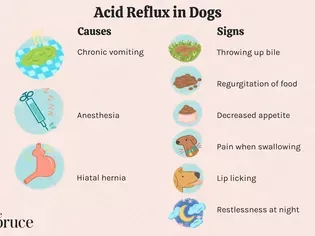Acid Reflux in Dogs
Updated on 05/27/24

Acid Reflux in Dogs: A Comprehensive Guide for Concerned Pet Owners
Acid reflux, also known as gastroesophageal reflux disease (GERD), is a common health condition that affects both humans and our furry companions. While it can be an uncomfortable and distressing experience for dogs, understanding the causes, symptoms, and treatment options can help you provide your pet with the best possible care.
Causes of Acid Reflux in Dogs
* Weak Lower Esophageal Sphincter (LES): The LES is a muscular valve that separates the stomach from the esophagus. When it is weak or relaxes inappropriately, stomach contents can flow back into the esophagus.
* Hiatal Hernia: This occurs when a portion of the stomach pushes through an opening in the diaphragm and into the chest cavity. It can weaken the LES and lead to acid reflux.
* Obesity: Excess weight puts pressure on the abdomen, which can push stomach contents back up into the esophagus.
* Certain Medications: Some medications, such as aspirin and ibuprofen, can irritate the lining of the stomach and esophagus, leading to acid reflux.
* Other Medical Conditions: Thyroid disease, diabetes, and liver disease can also contribute to acid reflux in dogs.
Symptoms of Acid Reflux in Dogs
* Vomiting: Dogs with acid reflux may experience vomiting, often of undigested food or stomach secretions.
* Regurgitation: Regurgitation is different from vomiting and involves the passive flow of stomach contents back into the mouth.
* Dysphagia: Difficulty swallowing can be a sign of acid reflux, as the acidic contents can irritate the esophagus.
* Chronic Cough: Acid reflux can cause irritation and inflammation of the larynx, leading to a persistent cough.
* Loss of Appetite: The discomfort associated with acid reflux can reduce a dog's appetite.
* Behavioral Changes: Acid reflux can make dogs lethargic, irritable, or anxious.
Examples of Acid Reflux Symptoms
* A dog vomits up undigested food several hours after eating.
* A dog repeatedly regurgitates stomach fluids that resemble slimy foam.
* A dog has difficulty swallowing and may gag or cough while eating.
* A dog coughs excessively, especially after meals or when lying down.
* A dog loses interest in food and eats less than usual.
Diagnosis and Treatment of Acid Reflux in Dogs
If you suspect your dog may be suffering from acid reflux, it is essential to seek veterinary attention. Your veterinarian will perform a physical examination, take a medical history, and may recommend diagnostic tests, such as an endoscopy or barium swallow study.
Treatment for acid reflux in dogs typically involves a combination of lifestyle modifications and medications.
Lifestyle Modifications
* Weight Loss: If your dog is overweight, losing weight can help reduce pressure on the abdomen and improve LES function.
* Dietary Changes: Avoiding fatty, spicy, or acidic foods can help minimize stomach irritation. Small, frequent meals are also beneficial.
* Elevated Feeding Position:Raising your dog's food and water bowls can help reduce stomach pressure.
* Reducing Stress: Stress can trigger acid reflux, so providing a calm and supportive environment for your dog is important.
Medications
* Antacids: These medications neutralize stomach acid, providing immediate relief from symptoms.
* Proton Pump Inhibitors (PPIs): PPIs block acid production in the stomach.
* H2 Receptor Blockers: These medications reduce stomach acid secretion.
Other Treatment Options
* Surgery: In severe cases, surgery may be necessary to correct a hiatal hernia or strengthen the LES.
* Alternative Therapies: Some pet owners find relief for their dogs through acupuncture or herbal remedies. However, it is important to consult with your veterinarian before pursuing these options.
Preventing Acid Reflux in Dogs
While not all cases of acid reflux can be prevented, there are steps you can take to minimize the risk.
* Regular Exercise: Exercise helps promote healthy digestion and reduces pressure on the abdomen.
* Avoid Certain Foods: Spicy, fatty, and acidic foods can trigger acid reflux.
* Elevate Food Bowls: Raising your dog's food and water bowls can help gravity keep stomach contents down.
* Reduce Stress: Stress can exacerbate acid reflux. Provide a stress-free environment for your dog.
Conclusion
Acid reflux is a common health condition that can affect dogs of all ages and breeds. By understanding the causes, symptoms, and treatment options, you can help your furry friend manage this condition effectively. With proper care, dogs with acid reflux can live happy and comfortable lives. Remember to consult with your veterinarian if you have any concerns about your dog's health.
Explore More Pets

Basic Training
Puppy and Baby Introductions

Working Dog Breeds
All About Search and Rescue Dogs

Dog Treatments
Puppy Vaginitis: Signs, Causes and Treatment

Dog Adoption
After More Than 1,200 Days in the Shelter, Coco Goes Home

Basic Training
How to Train Your Puppy to Go on Potty Pads

Hybrid Dog Breeds
The Difference Between a Mutt, Mixed Breed, or Designer Dog?

Dog Treatments
Nail Problems in Dogs

Puppies
7 Reasons Why Two Dogs Are Better Than One
